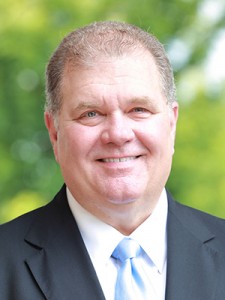TBMB president and executive director Randy C. Davis provides answers to pastors from across the state during webinar
By David Dawson
ddawson@tnbaptist.org
 FRANKLIN — Randy C. Davis anticipated some hard questions. In fact, he was counting on them.
FRANKLIN — Randy C. Davis anticipated some hard questions. In fact, he was counting on them.
Davis, president and executive director of the Tennessee Baptist Mission Board, wanted the first-ever “Ask Randy” webinar, hosted by the TBMB on Nov. 3, to be an honest and frank discussion on a wide variety of topics that were on the hearts and minds of pastors across the state.
In the days leading up to the webinar, Tennessee pastors were invited to submit topics for Davis to address during the webinar. Davis answered the questions during the roughly 45-minute Zoom call.
Below are excerpts from a few of the discussed topics. NOTE: The entire transcript is available at baptistandreflector.org and the video can be viewed at tnbaptist.org/askrandy.
Regarding attorney-client privilege and the SBC Executive Committee
Davis was asked about the recent decisions made by the SBC Executive Committee regarding attorney-client privilege and the resignations of Ronnie Floyd and other board members.
Davis said he respects both sides of the argument in regard to waiving attorney-client privilege, and said he believes there was potentially some middle ground to be found.
“Please understand that I’m not a defender of waiving attorney-client privilege, nor am I an advocate of it,” he said.
“I’m just like most Baptists. I’m trying to look at it and figure out exactly what it is. I don’t know the ramifications of waiving attorney-client privilege, what those might be. … I’m learning with everyone else,” he said.
Davis said he felt many members of the Executive Committee were strained by the decision, and said reaching a decision was not as straightforward as it might have appeared to those outside.
“If you followed it — and I watched a good portion of when they had their sessions that could be viewed online — it seems to me that they grappled a great deal with (it),” he said.
Davis said he personally knows several of the men and women who serve on the executive committee.
“They’re good-hearted people that have a great deal of integrity, and they, like all of us, abhor sexual abuse,” he said. “Ignoring sexual abuse and treating it lightly is a horrible, horrible sin.”
Davis expressed his disappointment in the animosity that was generated by the topic. “We’ve got a big problem if we cannot respect one another when it comes to disagreement on how to do something,” he said. “(In the current culture), if you disagree with someone, then the thing to do is vilify them, question their motives, assume the worst.”
Davis “called out” this line of thinking, saying it was “distasteful” to think that those who resigned did so because they “must be hiding something.”
“I assume they’re not, and I assume they’re not based on decades of integrity and decades of reputation,” he said.
Regarding the “state of the SBC”
One of the first questions submitted was the “million-dollar-question” — one that Davis has been hearing a great deal in recent days. The inquiry, essentially, was this: What’s happening in the Southern Baptist Convention?
Davis responded by saying that, yes, there are many heavy and emotionally-charged topics that the SBC is dealing with at the present time. However, he said, there are many things to celebrate and anticipate regarding the overall “state” of the SBC.
“I think a lot of our pastors and laymen are brokenhearted over what’s going on in our beloved network of churches, our bigger family, called the Southern Baptist Convention,” he said, “but I don’t want us to lose heart.”
Davis pointed to global mission work, foster care, orphan care and the excitement taking place on the Christian campuses, such as Carson-Newman and Union Universities, as just a few reasons for Baptists to rejoice.
“I know what people are thinking (when they ask the question about the SBC), but I want them to also know that what’s going on is incredible,” he said. “We need to keep pushing forward.”
Regarding CRT at the SBC annual meeting
Davis was asked by one pastor, “Why did James Merritt and the resolution committee refuse to deal with CRT during the SBC?”
“I would’ve preferred that the resolution that was brought forward by the resolutions committee would have addressed CRT, but let me just say that I’ve got that resolution in front of me, and what they say here is pretty strong,” he said.
Davis referred to Resolution Two, which was called “On the Sufficiency of Scripture for Race and Racial Reconciliation.”
He noted that the resolution notes the messengers at the SBC meeting in Nashville affirmed the sufficiency of Scripture on race and racial reconciliation, and resolved to affirm the agreement with historic, biblically faithful Southern Baptist condemnations of racism in all forms.
“Now, there’s a lot more meat on those bones,” he said, “but basically what they said in this resolution is that the Scripture is sufficient, and the problem with racism is sin, and nothing else. I applaud that resolution.”
Regarding CP giving
Near the end of the webinar, Davis discussed the topic of churches that are considering withdrawing their Cooperative Program giving.
“I want you to know that if you were to stop giving through the cooperative program tomorrow, great work happening in the state of Tennessee would be hampered and hurt,” he said.
Davis applauded churches that have continued to give to the Cooperative Program, even during the pandemic.
“We (recently) concluded our cooperative program fiscal year, as far as receiving cooperative program dollars,” Davis said, “and I’m thrilled to report today that last year we came within a fraction of a percent, a fraction of a percent, to reaching our $35 million cooperative program goal, and we had more than $700,000 more come in this year than last year.” B&R

